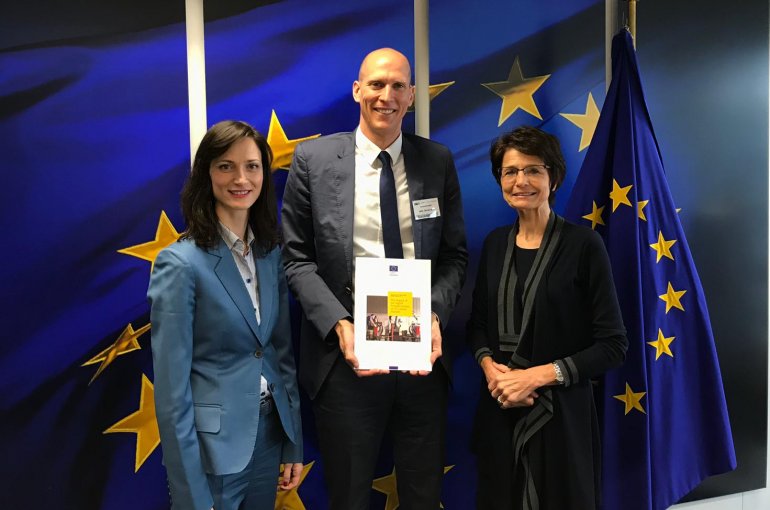A new employment contract: Data as Labour
Professor Maarten Goos presents expert report to European Commission

Your boss no longer pays you for your time spent at work, but also for the data you generate. It is one of the out-of-the-box ideas of a European High-Level Expert group, led by Maarten Goos, professor at Utrecht University. The advice of the experts from industry, government and science, was presented to the European Commission on Monday 8 April.
“Everyone who’s working, is creating valuable data, says Maarten Goos, professor of Economics and Institutions and one of the key figures in the Future of Work hub of Utrecht University. "Whether you work in an office, are a teacher or a truck driver. You create mailing lists, teaching methods and knowledge about logistics. Everything you enter into a system is valuable information. In the present time, you leave a lot of that data behind. It is usually owned by companies, which are making increasingly intensive use of data with the rise of Big Data and Artificial Intelligence. You are paid for the time you put into your work, or for your diploma, but not for the data you share with your employer. Why not?”
Redistributing the value of digital ownership
It is time for a redistribution of the value of data, is the advice of the European High Level Expert Group in its report The Impact of the Digital Transformation on EU Labour Markets. It was presented to the European Commission on 8 April.

Our data can be seen as a form of labour or intellectual property. The data represents a value, for which we can be compensated. European Union law on the protection of personal data, including the European General Data Protection Regulation (GDPR) already aims to shift the rights of data (value) creation to the users that generate them. Direct compensation of employees for their data ("Data as Labour") is a new and better way to redistribute the wealth of digitisation than the much-discussed business tax on income from digital activities, according to professor Goos. "Data as Labour does not redistribute "ex-post", like a benefit paid with taxpayers' money, but is done "pre-market" and is simple, direct and fair.”
Data as Labour does not redistribute "ex-post", like a benefit paid with taxpayers' money, but is done "pre-market" and is simple, direct and fair.
"Europe has a good tradition of social protection”
Looking at digital ownership differently can even be a means to combat social inequality, says Goos. Big data as an aid to social security. "Suppose you reduce the minimum wage. This is less a problem for a student, working a side job, than for a working single parent."

The parent might struggle to pay rent as well as the education of children. Due to this accumulation of risks, the family might fall below the poverty line. The government can, with the help of data map these risks and relate them to each other, using self-learning algorithms. This knowledge can then be used in apps to warn families, or policy makers. It might send reminders of vacancies for new jobs in the neighbourhood."”
An agenda for the Future of Work
The report of the ten experts of theHigh Level Group on the Impact of the Digital Transformation on EU Labour Markets was presenterd on Monday 8 April to the European Commissioners Mariya Gabriel (Digital Economy and Society) and Marianne Thyssen (Employment, Social Affairs, Skills and Labour Mobility). The experts come from different EU countries, from academia, civil society, as well as industry. They worked together during 2018 and 2019. The report contains all kinds of concrete and innovative advice to policy makers. The work is in line with the activities of the Future of Work hub of Utrecht University, in which researchers from various disciplines study the future of work and its impact in individuals and society.
More info and contact
Professor Maarten Goos is available for interviews.
For more information, please contact Maarten Post, press officer at Utrecht University.
m.a.g.post@uu.nl
0031-6-52513511

De experts komen uit verschillende Europese landen en zowel uit het bedrijfsleven, de wetenschap als de overheid. Op basis van vergaderingen en denksessies schreven ze het rapport gedurende driekwart jaar. Het rapport bevat allerlei concrete en innovatieve adviezen aan beleidsmakers over de arbeidsmarkt. Het sluit hiermee aan bij het werk van de Future of Work hub van de Universiteit Utrecht, waarin onderzoekers uit verschillende disciplines gezamenlijk, en samen met maatschappelijke partners, de toekomst van werk bestuderen en de invloed daarvan op mens en maatschappij.
Meer info en contact
Professor Maarten Goos is beschikbaar voor interviews.
Persvoorlichting via woordvoerder Maarten Post, Universiteit Utrecht
m.a.g.post@uu.nl
06-52513511

